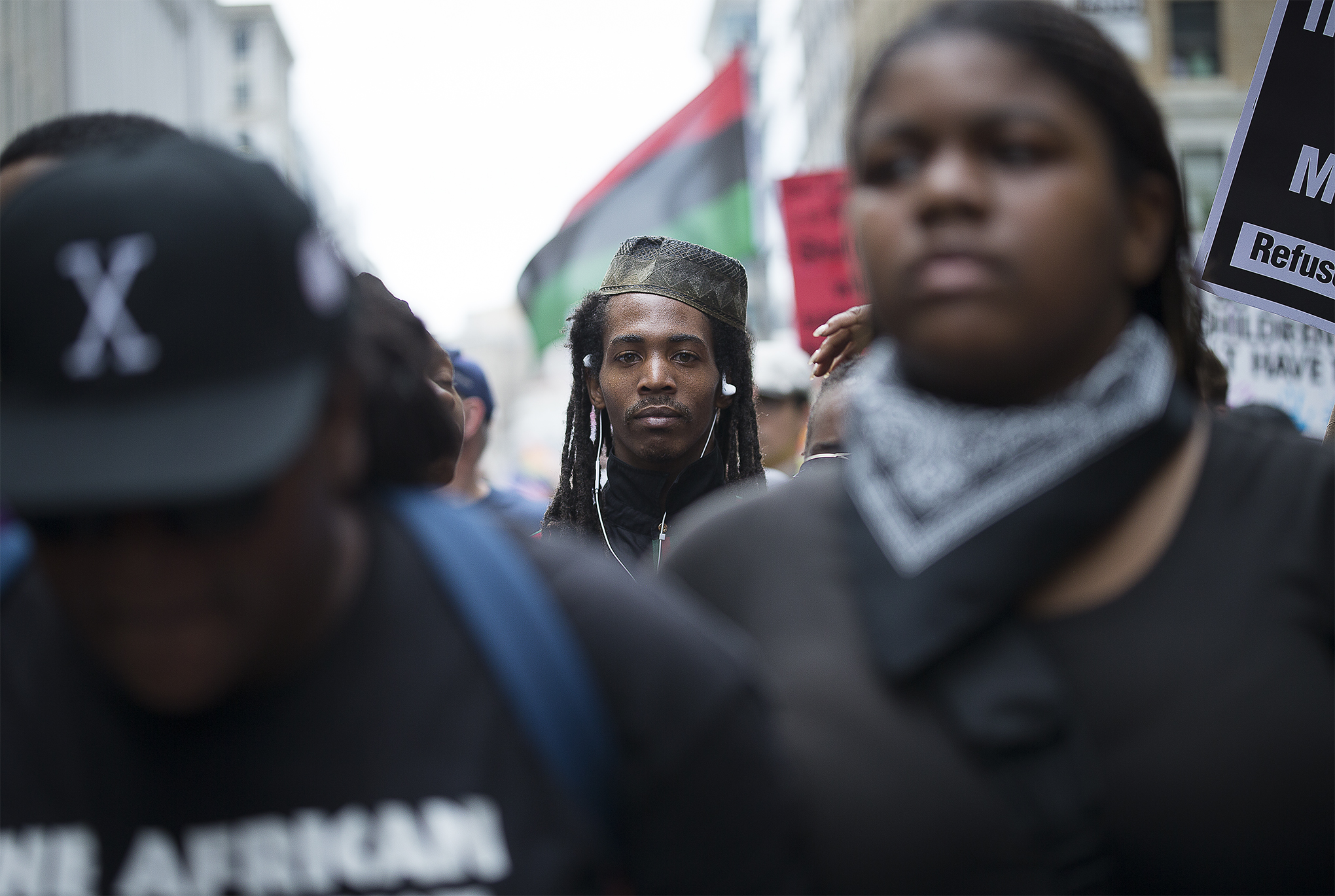
Black Lives Matter demonstrators are seen near Lafayette Square in Washington Aug. 12, 2018, during the start of the white nationalists' rally "Unite the Right 2." (CNS photo/Tyler Orsburn)
Several years ago, Cardinal Timothy Dolan described Dorothy Day as "a saint for our time." I think there is something to this idea of a saint serving not only as patron for a profession or country but also for an entire era. Just as Thomas More might have special qualities toward which politicians should aspire, "a saint for our time" suggests that in navigating the unique challenges and opportunities of a given age, we can look to certain peoples' experiences for particular guidance.
Though he has not been canonized, beatified or even declared venerable or a servant of God, the life of the late New Orleans Archbishop Joseph Rummel might serve this purpose today.*
Born in Germany in 1876, Rummel moved to New York as a boy, became archbishop of New Orleans in 1935, and led a relief program President Franklin Roosevelt established to aid refugees fleeing the Nazis during WWII. It is for his stance on issues of race, however, that he is most remembered.
In 1949, Rummel responded to New Orleans officials' decision to ban black worshipers from a celebration by canceling it. A year later, he removed "White" and "Colored" signs from the archdiocese's churches, and in 1953, the year before the Supreme Court reached a unanimous decision in Brown V. Board of Education, Rummel wrote a pastoral letter calling for "no further discrimination or segregation in the pews, at the Communion rail, at the confessional, and in parish meetings …" Two years later, he closed a church that refused to welcome a black priest, chastising parishioners for their "act of injustice, uncharitableness, and irreverence."
Rummel's efforts were often ignored, but after yielding to critics and postponing the official end of segregation within his archdiocese's educational system, he ordered the integration of all Catholic schools in 1962. When several prominent Catholics refused to bend, Rummel excommunicated them.
So why might Rummel be a "saint for our time"? Because race, as The Wall Street Journal's Gerald F. Seib writes, "remains the great unresolved issue" in the United States? Certainly. But Rummel's witness on race offers lessons that speak to some of our broader social struggles, of which race is one example.
It is no secret that the United States are not particularly united at the moment.
Advertisement
"We really are two different Americas," wrote Republican pollster Frank Luntz in Time last year.
"America may be more divided now than at any time since the Civil War," lamented a headline in Salon two years ago.
For many of us, the answer to this divisiveness has not been to reach out to those with whom we disagree but to wish them away. Yes, the people chanting, "Send her back" at a "Make America Great Again" rally were displaying racism, but they were also suggesting that there is no reason to engage with their political opponents. Instead, these people should simply go away. As the president said two days before the rally, "If you're complaining all the time, very simply, you can leave."
Others of us respond by writing people off as unreachable — whether it is Hillary Clinton painting some of Donald Trump's supporters as a "basket of deplorables" or Mitt Romney effectively describing 47 percent of voters as moochers.
Aside from being unproductive, each of these sentiments is grossly un-Christian, at odds with everything from the Parable of the Lost Sheep to Jesus' directions for resolving conflict in Matthew 18. They fail to recognize the basic dignity of every person, even those we don't especially like.
In his 1953 pastoral letter calling for equal treatment within his archdiocese's churches, Rummel declared "[T]here will be no segregation in the kingdom of heaven." While he was referring specifically to race, his comment can describe any of the superficial ways we build walls between ourselves.
I once heard a poetic account of the Last Judgment in which people were blocked from passing through the gates not by their own sins but by their own sense of scandal and unwillingness to enter when they saw all the people they detested who had been allowed in.
Racism is contrary to God's will. So is every cruel and petty reason we devise to separate instead of joining, to split instead of bridging. With the hope and expectation that these barriers will not be tolerated in eternity, we should get busy learning to live together by tearing them down now.
*Special thanks to my great uncle, Fr. Edward Carroll, for bringing Archbishop Rummel's story to my attention.
[Brian Harper is an alumnus of Fordham University's Graduate Program in International Political Economy and Development and Marquette University. He previously worked in communications with the Midwest Jesuits and served as a Jesuit Volunteer in Peru. His writing has been featured in America, the Milwaukee Journal Sentinel, Counterpunch, Mic, and various other publications. You can read his work and listen to his music at www.brianharper.net.]




